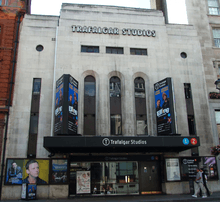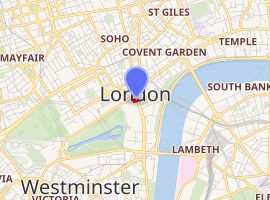Trafalgar Studios
Trafalgar Studios, formerly the Whitehall Theatre until 2004, is a West End theatre in Whitehall, near Trafalgar Square, in the City of Westminster, London. Built in 1930 with interiors in the Art Deco style, the theatre regularly staged comedies and revues. It was converted into a television and radio studio in the 1990s, before later returning to theatrical use.
Whitehall Theatre | |
 Trafalgar Studios in 2007 | |

| |
| Address | Whitehall London, SW1 United Kingdom |
|---|---|
| Public transit | |
| Owner | Trafalgar Entertainment Group |
| Designation | Grade II |
| Type | West End theatre |
| Capacity | Studio 1: 380 seats Studio 2: 100 seats |
| Construction | |
| Opened | 29 September 1930 |
| Rebuilt | 2004 (Tim Foster and John Muir) |
| Architect | Edward A. Stone |
| Website | |
| Trafalgar Studios website | |
History
1930 to 1996
The original Whitehall Theatre, built on the site of the 17th century Ye Old Ship Tavern was designed by Edward A. Stone, with interiors in the Art Deco style by Marc-Henri and Laverdet. It had 634 seats.[1] The theatre opened on 29 September 1930 with The Way to Treat a Woman by Walter Hackett, who was the theatre's licensee. In November 1933 Henry Daniell appeared there as Portman in Afterwards. Hackett presented several other plays of his own before leaving in 1934, and the theatre built its reputation for modern comedies throughout the rest of the decade. During World War II it housed revues, which had become commonplace entertainment throughout the West End. In 1942, The Whitehall Follies, featuring Phyllis Dixey, the first stripper to perform in the theatre district, opened with great fanfare and became an immediate success. Dixey leased the theatre and remained in it for the next five years.

A series of five long-running farces, presented under the umbrella title "Whitehall farce" by the actor-manager Brian Rix, were staged at the theatre from 1950 to 1966: Reluctant Heroes, by Colin Morris (1950–54); Dry Rot, by John Chapman (1954–58); Simple Spymen (1958–61); One For the Pot, by Ray Cooney and Tony Hilton (1961–64); and Chase Me, Comrade, by Cooney (1964–66). Excerpts from the shows were televised by the BBC.[2][3][4]
The building was acquired in 1971 by Paul Raymond who was producer of a nude review that had opened there in 1969 called Pyjama Tops, it ran for five years after which productions including Ipi Tombi and Anyone for Denis? had successful runs. The building was shuttered until July 1982 when a production of Private Dick starring Robert Powell ran for 16 weeks. It then briefly housed an exhibition of World War II memorabilia known as The Whitehall Theatre of War. Acquired from the Paul Raymond Organisation in 1985 by Maybox Theatres the Theatre came under the direction of Ian Albery. After considerable refurbishment that retained most of its Art Deco features, it reopened on 5 March 1986 with a successful revival of J.B. Priestley's When We Are Married. Subsequent productions included When I Was a Girl I Used to Scream and Shout by Sharman Macdonald, The Importance of Being Earnest, The Foreigner, Run For Your Wife, Absurd Person Singular, Travels with My Aunt, tributes to Patsy Cline, Roy Orbison and the Blues Brothers, and solo performances by Ennio Marchetto and Maria Friedman.
1997 to present
Between 1997 and 1999, the theatre was converted into a television and radio studio used primarily to broadcast Jack Docherty's talk show and BBC Radio 4's Live from London. It returned to theatrical use, with such productions as Three Sisters, Puppetry of the Penis, "Art", Rat Pack Confidential, and Sing-a-Long-a-ABBA, before its owner, the Ambassador Theatre Group, announced the building would be reconfigured and reopen with a new name.
The current building contains two intimate theatres designed by architects Tim Foster and John Muir. Studio 1, the larger of the two spaces with 380 seats, opened on 3 June 2004 with the Royal Shakespeare Company's production of Othello. Studio 2, with 100 seats, opened in October 2005 with the play Cyprus.[5][6]
Since 2004, Trafalgar Studios has presented short runs of revivals of classic plays and musicals, including Sweeney Todd (2004); Losing Louis (2005); a season by the RSC repertory season, from December 2005 to February 2006, of plays including Sir Thomas More, Sejanus: His Fall and Believe What You Will; an adaptation of Jane Eyre by Polly Teale (2006); Bent (2006–07); Elling (2007); Dealer's Choice (2007–08); Fat Pig (2008, transferring to the Comedy Theatre); Entertaining Mr Sloane (2009) and A Christmas Carol (2010–11). Three Days in May showed at the theatre from November 2011 to March 2012.
The theatre was Grade II listed by English Heritage in December 1996, noting "The auditorium has a decorative cohesion and prettiness rare in theatres of its day, and has the best surviving original fabric of this type of theatre".[7]
In May 2016, Howard Panter and Rosemary Squire, founders and former owners of Ambassador Theatre Group, announced they were stepping down from ATG to set up their own production company called Trafalgar Entertainment Group (TEG), which would take control of Trafalgar Studios.[8] In May 2020, planning permission was granted to return the premises to a 630-seat theatre. Since the building's listed status meant the 2004 changes had to be reversible, it will be possible for the theatre to be restored to its previous form, if the owners should decide to continue. The planning submission predated the COVID-19 pandemic.[9]
Recent and present productions
- On Blueberry Hill (5 March – 2 May 2020)[10]
- A Taste of Honey (5 December 2019 – 29 February 2020, starring Jodie Prenger[11])
- A Day in the Death of Joe Egg (14 October – 30 November 2019, starring Toby Stephens and Claire Skinner)[12]
- Equus (6 July – 7 Sept 2019)[13]
- Education, Education, Education (31 May – 29 June 2019)[14]
- Admissions (28 February – 25 May 2019, starring Alex Kingston[15])
- Nine Night (1 December 2018 - 23 February 2019)[16]
- Misty (8 September – 17 November 2018)[17]
- Killer Joe (18 May – 18 Aug 2018, starring Orlando Bloom[18])
- The Grinning Man (6 December 2017 – 5 May 2018)[19]
- Apologia (29 July – 18 November 2017, starring Stockard Channing as Kristin Miller, Freema Agyeman as Claire; written by Alexi Kaye Campbell)[20]
- The Naked Magicians (31 August – 24 September 2016)[21]
- The Ruling Class (16 January – 11 April 2015, starring James McAvoy)[22]
- East Is East (4 October 2014 – 3 January 2015, starring Jane Horrocks and Ayub Khan-Din)[23]
- Richard III (1 July – 27 September 2014, starring Martin Freeman[24])
- Another Country (26 March – 21 June 2014)[25]
- The Pride (14 August 2013 – 9 November 2013)[26]
- The Hothouse (4 May – 3 August 2013, starring John Simm and Simon Russell Beale)[27]
- Macbeth (9 February – 27 April 2013, starring James McAvoy in the title role)[28]
- Three Days in May (2 November 2011 – 3 March 2012)[29]
Nearby Tube stations
Notes
- Gaye, pp. 1555–1555
- "12 Successful Years for Mr. Brian Rix", The Times, 13 September 1962, p. 12
- Gaye, pp. 1530–38
- Smith, p. 91
- Limited, London Theatre Direct. "Trafalgar Studios London – Tickets, Location & Seating Plan". www.londontheatredirect.com. Retrieved 2020-05-12.
- "Venues: Trafalgar Studios 1". Official London Theatre. Retrieved 2020-05-12.
- English Heritage listing details accessed 28 April 2007
- "Theatre's power couple step back from ATG to run Trafalgar Studios". The Telegraph. Retrieved 2017-07-24.
- Masso, Giverny (4 May 2020). "Trafalgar Studios granted planning permission to merge two spaces into single auditorium". The Stage. Retrieved 4 May 2020.
- "On Blueberry Hill review, Trafalgar Studios, London, 2020". The Stage. Retrieved 2020-05-12.
- "A Taste of Honey review – sweet songs and sour love". The Guardian. 10 December 2019. Retrieved 4 March 2020.
- "Review: A Day in the Death of Joe Egg (Trafalgar Studios) | WhatsOnStage". www.whatsonstage.com. Retrieved 2020-05-12.
- "Equus - Stratford East". stratfordeast.com. Retrieved 2020-05-12.
- "The Wardrobe Ensemble: Education, Education, Education - Trafalgar Studios". Shoreditch Town Hall. Retrieved 2020-05-12.
- "Admissions star Alex Kingston: 'Similarities with the US college scandal are extraordinary'". Evening Standard. 13 March 2019. Retrieved 4 March 2020.
- "Nine Night at Trafalgar Studios | National Theatre". www.nationaltheatre.org.uk. Retrieved 2020-05-12.
- "Review: Misty (Trafalgar Studios) | WhatsOnStage". www.whatsonstage.com. Retrieved 2020-05-12.
- "Killer Joe: Why Orlando Bloom wanted to play a misogynist and a sociopath". BBC News. 6 June 2019. Retrieved 4 March 2020.
- "Review: The Grinning Man (Trafalgar Studios) | WhatsOnStage". www.whatsonstage.com. Retrieved 2020-05-12.
- Billington, Michael (2017-08-04). "Apologia review – Stockard Channing induces sympathy for a monstrous matriarch". The Guardian. ISSN 0261-3077. Retrieved 2020-05-12.
- "The Naked Magicians Trafalgar Studios London". www.officialtheatre.com. Retrieved 2020-05-12.
- "The Ruling Class (Trafalgar Studios) | WhatsOnStage". www.whatsonstage.com. Retrieved 2020-05-12.
- "East is East (Trafalgar Studios) | WhatsOnStage". www.whatsonstage.com. Retrieved 2020-05-12.
- Star of The Hobbit Martin Freeman to play Richard III accessed 22 April 2014
- Spencer, Charles (2014-04-03). "Another Country, Trafalgar Studios, review". ISSN 0307-1235. Retrieved 2020-05-12.
- "The Pride, Trafalgar Studios - theatre review". Evening Standard. 2013-08-14. Retrieved 2020-05-12.
- "The Hothouse – review". the Guardian. 2013-05-09. Retrieved 2020-05-12.
- "Review: Macbeth starring James McAvoy, Trafalgar Studio 1, London". The Independent. 2013-02-23. Retrieved 2020-05-12.
- "Theatre Review: Three Days In May @ Trafalgar Studios". Londonist. 2011-11-03. Retrieved 2020-05-12.
References
- Guide to British Theatres 1750–1950, John Earl and Michael Sell pp. 146–7 (Theatres Trust, 2000) ISBN 0-7136-5688-3
- Theatre history
- Who's Who in the Theatre, edited by John Parker, tenth edition, revised, London, 1947, pps: 477–478.
- Gaye, Freda (ed.) (1967). Who's Who in the Theatre (fourteenth ed.). London: Sir Isaac Pitman and Sons. OCLC 5997224.CS1 maint: extra text: authors list (link)
- Smith, Leslie (1967). Modern British Farce: A Selective Study of British Farce from Pinero to the Present Day. Basingstoke: Macmillan. ISBN 0-333-44878-2.